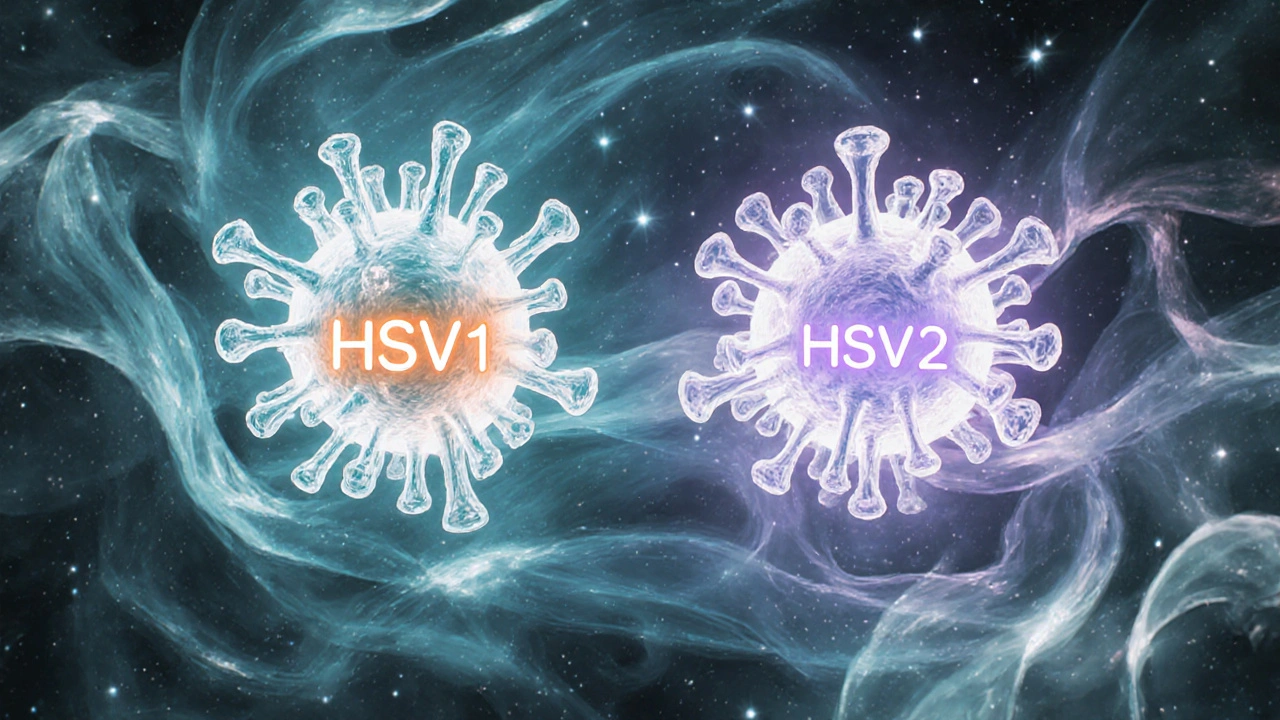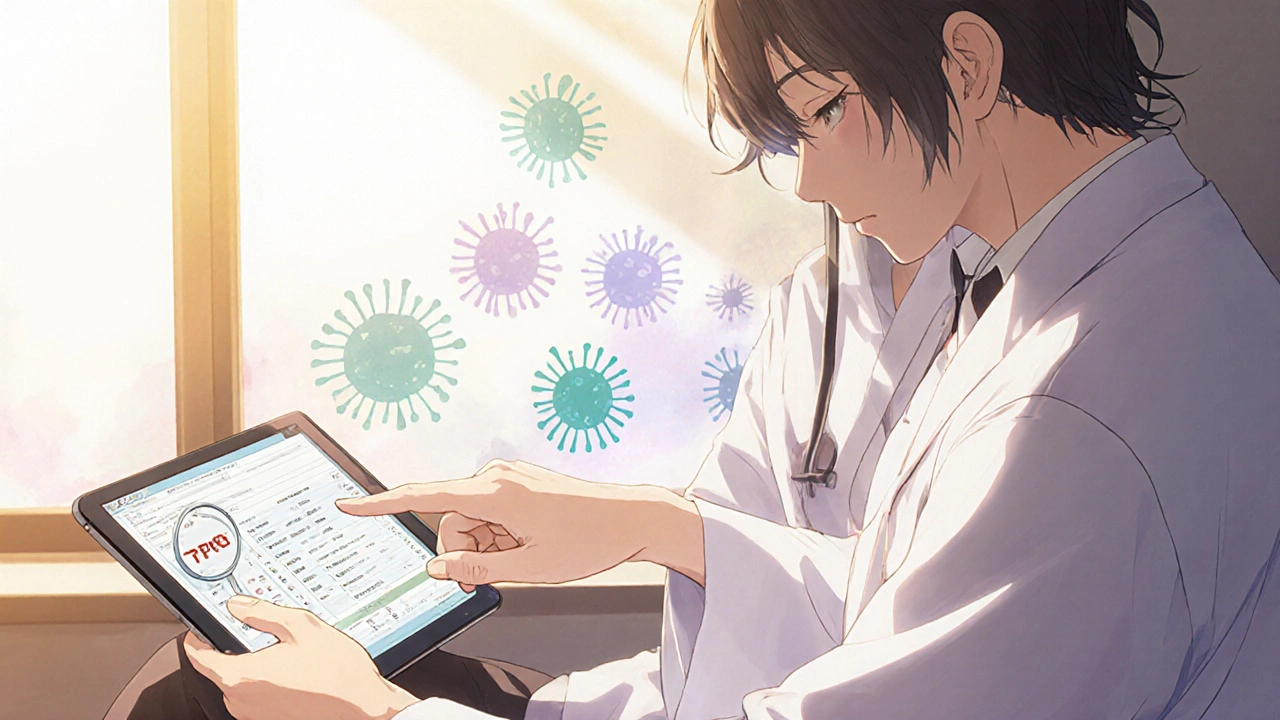
Herpes Transmission Risk Calculator
Estimate your risk of herpes transmission based on contact type, prevention methods, and symptom status. This tool provides general guidance and is not a substitute for medical advice.
Transmission Risk Estimate
Key Factors in Your Risk
Risk Reduction Strategies
If you’ve ever wondered what herpes really means, you’re not alone. The virus is common, often misunderstood, and can cause unnecessary worry. This guide breaks down the basics-what the virus is, how you catch it, what signs to watch for, and how modern medicine can keep it under control.
When people hear the term Herpes simplex virus (HSV), they often think of something scary. In reality, HSV is a common virus that most adults encounter at some point. Understanding how it spreads, shows up, and can be managed helps cut down fear and misinformation.
What Is Herpes Simplex Virus?
HSV belongs to the Herpesviridae family, a group of DNA viruses that establish lifelong infections. There are two main types:
- HSV‑1: Typically causes oral lesions, commonly called cold sores.
- HSV‑2: Usually responsible for genital herpes.
Both types can infect either location, but their primary patterns differ because of how the virus is usually transmitted.
How Do You Get Infected?
Transmission hinges on direct contact with infected skin or mucous membranes. The virus can spread during three key phases:
- During an outbreak: Visible sores contain high viral loads.
- Asymptomatic shedding: Even without sores, the skin can release virus particles.
- From mother to baby: Neonatal herpes can occur during childbirth if the mother has an active genital infection.
Common routes include kissing, oral sex, vaginal or anal intercourse, and sharing items like lip balm or razors that have touched a lesion.
Recognizing the Symptoms
Symptoms vary by location and by individual immune response. Here’s what to expect:
- Prodrome: Tingling, itching, or burning sensations 1-2days before a sore appears.
- Oral herpes (cold sores): Small fluid‑filled blisters on the lip, gum, or inside the mouth that crust over in 7-10days.
- Genital herpes: Painful ulcers on the penis, vulva, cervix, or anus, often accompanied by flu‑like symptoms such as fever and swollen lymph nodes.
- Atypical presentations: Some people experience only mild itching or a single lesion that heals quickly, making diagnosis tricky.
Recurrent outbreaks become less severe over time as the immune system learns to keep the virus in check.
Diagnosing Herpes
Because early lesions can look like other skin conditions, a professional diagnosis is key. The main tools are:
- Polymerase chain reaction (PCR) swab: Detects viral DNA with >95% accuracy.
- Viral culture: Grows the virus from a lesion sample; less sensitive than PCR.
- Serologic blood test: Checks for HSV‑1 and HSV‑2 antibodies, useful for confirming past exposure when no active lesions are present.
Testing is quick, usually covered by public health systems, and helps guide treatment decisions.
Treatment Options
While there’s no cure, antivirals keep the virus from causing frequent or severe outbreaks. The primary drugs are:
- Acyclovir: The oldest and most widely used oral medication; typically taken five times a day for an acute outbreak.
- Valacyclovir: A pro‑drug of acyclovir with better bioavailability; dosing is simpler (often a single daily dose for suppressive therapy).
- Famciclovir: Similar to valacyclovir, useful for patients who experience side‑effects from the other two.
For severe cases, intravenous acyclovir may be required, especially in immunocompromised patients or neonates.
In addition to medication, supportive care speeds healing:
- Keep lesions clean and dry.
- Apply over‑the‑counter topical anesthetics (e.g., lidocaine) for pain relief.
- Avoid touching sores; wash hands frequently.
- Use sunscreen on lip skin to prevent UV‑triggered recurrences.

Suppressive Therapy: Staying Out of the Spotlight
For people with frequent outbreaks (four or more per year) or those who want to reduce transmission risk, daily suppressive therapy is an option. Studies from 2023‑2024 show that a 500mg dose of valacyclovir once daily cuts genital shedding by roughly 80%.
Prevention and Risk Reduction
Because HSV is highly contagious, practical steps matter:
- Use condoms or dental dams during sexual activity, even when no sores are visible.
- Ask partners about their HSV status and share your own.
- Avoid sexual contact during prodrome or active outbreak.
- Don’t share personal items that touch the lips or genitals.
- Consider antiviral suppressive therapy if you have frequent recurrences.
Vaccines are still in clinical trials, with several candidates showing promise, but none are yet approved for public use.
Living with Herpes: Psychological and Social Aspects
Beyond the physical symptoms, the diagnosis can stir anxiety, stigma, or relationship strain. Research from the University of Auckland (2022) found that 62% of newly diagnosed individuals reported feeling isolated, but counseling and peer support groups dramatically improved coping scores.
Key tips for mental well‑being:
- Educate yourself-accurate knowledge reduces fear.
- Talk openly with trusted partners; honesty builds intimacy.
- Seek professional counseling if anxiety persists.
- Join online communities where members share experiences and coping strategies.
When to See a Healthcare Provider
Schedule an appointment if you notice any of the following:
- First‑time lesions that don’t heal within two weeks.
- Severe pain, fever, or swollen lymph nodes.
- Pregnancy-HSV can affect delivery decisions.
- Signs of a new infection after a recent exposure.
Early treatment shortens outbreak duration and reduces the chance of spreading the virus.

HSV‑1 vs HSV‑2: Quick Comparison
| Feature | HSV‑1 | HSV‑2 |
|---|---|---|
| Common site | Oral/lip (cold sores) | Genital area |
| Typical transmission | Kissing, oral‑sex | Sexual intercourse, genital‑genital contact |
| Recurrence rate | Less frequent, often triggered by UV exposure | More frequent; average 4‑6 outbreaks per year without suppressive therapy |
| Risk of neonatal infection | Low, unless genital infection is present | Higher; Cesarean delivery often recommended if active lesions at labor |
| Seroprevalence (2023 US data) | ≈70% | ≈12% |
Myths vs. Facts
Clearing up common misconceptions helps reduce stigma:
- Myth: You can get herpes from a toilet seat.
Fact: The virus dies quickly outside the body; transmission requires direct skin‑to‑skin contact. - Myth: If you’re on antivirals, you can’t pass it on.
Fact: Suppressive therapy reduces but does not eliminate shedding; safer sex practices remain essential. - Myth: Herpes always shows obvious sores.
Fact: Up to 80% of infected people experience subclinical shedding with no visible signs.
Bottom Line
Herpes simplex virus is highly prevalent, manageable, and far less dangerous than many think. Knowing how it spreads, recognizing early signs, and accessing antiviral treatment empower you to keep outbreaks mild and protect partners. If you suspect an infection, a quick swab test and a brief course of medication can make a world of difference.
Frequently Asked Questions
Can you cure herpes?
No cure exists yet, but antiviral drugs like acyclovir, valacyclovir, and famciclovir control outbreaks and lower transmission risk.
How long does a typical outbreak last?
Most oral or genital lesions heal within 7‑10days. Starting antivirals within 48hours can shorten this to 3‑5days.
Is it safe to have sex during a herpes outbreak?
Avoid sexual contact during active lesions or prodrome. Even with no sores, using condoms and suppressive therapy lowers risk but does not guarantee zero transmission.
Can you get HSV from a kiss?
Yes. HSV‑1 spreads easily through saliva or direct contact with a cold sore. Even without visible sores, asymptomatic shedding can transmit the virus.
Should pregnant women take antivirals?
If a pregnant woman has a history of genital herpes, doctors often prescribe suppressive valacyclovir from week 36 to reduce the chance of an outbreak during labor, which can protect the newborn.





Emily Rankin
October 17, 2025 AT 16:07In the grand tapestry of human experience, a virus like HSV is merely one thread, but its color can be brightened by knowledge and compassion.
When we understand the biology, the fear that once loomed becomes a manageable whisper.
Imagine each outbreak as a reminder that our bodies are resilient, constantly learning to keep the invader in check.
Modern antivirals act as gentle guardians, turning what could be a storm into a passing breeze.
By sharing accurate information, we lift the veil of stigma that shadows many lives.
In this way, the narrative shifts from shame to empowerment, and we all walk a little lighter.
Let’s keep the conversation alive, for every enlightened mind adds a spark to the collective hope.
Rebecca Mitchell
October 18, 2025 AT 06:00Just take a pill and stop obsessing over it.
Roberta Makaravage
October 19, 2025 AT 15:20Honestly, anyone who dismisses the seriousness of herpes is flirting with dangerous misinformation 😒.
Science shows that untreated outbreaks can increase transmission risk, so ignoring antivirals is ethically irresponsible 😤.
Vaccines are still in trials, but that doesn't give us a free pass to be reckless.
We must uphold personal responsibility: disclose status, use protection, and seek treatment promptly 🙅♀️.
Remember, ignorance is not a virtue; it’s a public health hazard 🌍.
Let’s elevate the discourse beyond gossip and focus on facts and moral duty 😊.
Lauren Sproule
October 21, 2025 AT 17:20hey i totally get where u r coming from but lets keep it chill
the info is solid and we can all learn without sounding like a lecture
if anyone feels scared just know there are options and help out there
talking openllly with partners can make things way easier
we're all in this together 🌟
CHIRAG AGARWAL
October 24, 2025 AT 14:47Bruh, this whole article reads like a textbook – boring as hell.
Seriously, just pop a pill and move on, no need for all that drama.
People make a big deal out of nothing, it's overhyped.
Why waste time when you can just live your life?
Carissa Padilha
October 28, 2025 AT 01:07What if the pharma industry purposely keeps us scared so they can sell more antivirals?
The CDC's guidelines could be a front for hidden agendas, and the "clinical trials" might be designed to keep the market humming.
Consider that the real cure might be suppressed to protect profit margins.
But maybe I'm just being paranoid, or maybe not.
Richard O'Callaghan
November 1, 2025 AT 10:40Yo, I think you guys are missing the bigger picture – once you actually read the fine print you see that the meds have side efcts you cant ignore.
Also, sharing straws might not be as safe as they claim, because viruses can stick to surfaces longer than we thought.
Don't just trust the doctors, question everything and keep your guard up.
And btw, I've heard some labs hide data on new vaccines.
Stay woke.
Alexis Howard
November 6, 2025 AT 01:47I'm not buying that, it's just hype.
Darryl Gates
November 11, 2025 AT 06:47First off, congratulations on taking the step to educate yourself about HSV – that alone is a major win.
Understanding the virus demystifies a lot of the fear that surrounds it, and knowledge is the foundation of good health management.
When you experience an outbreak, remember that it’s a temporary flare‑up, not a permanent label on your identity.
Antiviral medications such as acyclovir, valacyclovir, and famciclovir have been proven to reduce both the duration and severity of lesions, so adhering to the prescribed regimen is essential.
Consistency is key; missing doses can diminish efficacy and prolong healing time.
Additionally, maintaining good hygiene-keeping the affected area clean and dry-can prevent secondary bacterial infections and speed recovery.
Applying over‑the‑counter topical anesthetics can provide comfort, but be cautious of products that may irritate the skin.
Sun exposure is a common trigger for oral HSV recurrences, so using lip balm with SPF is a simple yet effective preventive measure.
In the context of sexual health, using condoms or dental dams reduces transmission risk, even when no sores are visible, because asymptomatic shedding does occur.
If you find yourself having frequent outbreaks-four or more per year-talk to your healthcare provider about suppressive therapy; a daily dose of valacyclovir can cut shedding by up to eighty percent and improve quality of life.
On the psychological side, it’s perfectly natural to feel anxious or isolated after a diagnosis, but connecting with support groups-online or in person-has been shown to mitigate those feelings and build resilience.
Open communication with partners fosters trust and reduces stigma, turning a potentially awkward conversation into an opportunity for mutual care.
Finally, remember that you’re not alone; millions of people live full, healthy lives with HSV.
Regular check‑ups, honest dialogue, and adherence to treatment plans will keep you in control.
Stay proactive, stay informed, and keep supporting each other-you’ve got this.